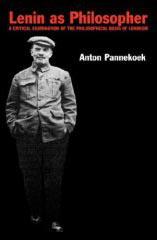Spartacus Review
Volume 13: 24th February, 2008
Russian History

Title: Lenin as Philosopher
Author: Anton Pannekoek
Editor:
Publisher: Merlin Press
Price: £10.95
Bookshop: Amazon
Spartacus Website: Lenin
Category:
In the aftermath of the Russian Revolution, Anton Pannekoek investigated the impact of Lenin's ideas and of his philosophical work Materialism and Empirio-criticism, which had appeared in Russian in 1908. In the book Pannekoek argues that the economic system created after the revolution was state capitalism and that a new class of officials was in charge. "Lenin as Philosopher: A Critical Examination of the Philosophical Basis of Lenin" was first published in 1938.

Title: Anti-Bolshevik Communism
Author: Paul Mattick
Editor:
Publisher: Merlin Press
Price: £14.95
Bookshop: Amazon
Spartacus Website: Russian Civil War
Category:
Communism aims at putting working people in charge of their lives. A multiplicity of Councils, rather than a big state bureaucracy is needed to empower working people and to focus control over society. Mattick develops a theory of a council communism through his survey of the history of the left in Germany and Russia. He challenges Bolshevik politics: especially their perspectives on questions of Party and Class, and the role of Trade Unions. Mattick argues that the revolutions which succeeded, first of all, in Russia and China, were not proletarian revolutions in the Marxist sense, leading to the association of free and equal producers, but state-capitalist revolutions, which were objectively unable to issue into socialism. Marxism served here as a mere ideology to justify the rise of modified capitalist systems, which were no longer determined by market competition but controlled by way of the authoritarian state. Based on the peasantry, but designed with accelerated industrialisation to create an industrial proletariat, they were ready to abolish the traditional bourgeoisie but not capital as a social relationship. This type of capitalism had not been foreseen by Marx and the early Marxists, even though they advocated the capture of state-power to overthrow the bourgeoisie but only in order to abolish the state itself.
